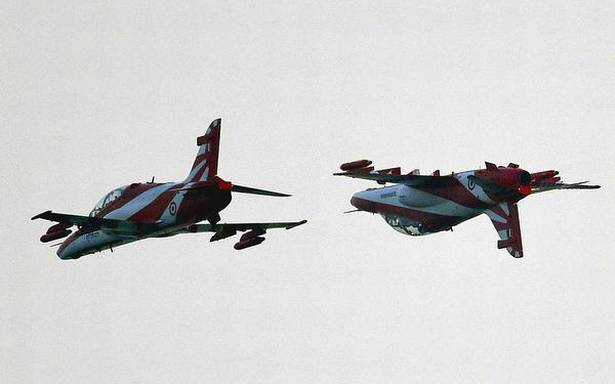Through Sri Lanka’s over three decade-strife, India, and its military, have played a significant role.
With the participation of the Indian Air Force Chief and 23 aircraft in the three-day event in Colombo to mark the 70th anniversary of the Sri Lanka Air Force (SLAF), India sought to reaffirm its strong defence cooperation with Sri Lanka. The last time Indian aircraft took part in such an event was in 2001, on the occasion of the SLAF’s 50th year, according to Captain Vikas Sood, Defence Adviser at the Indian High Commission.
A team of 4 Sarang Advance Light Helicopters, Surya Kiran (Hawks), Tejas Fighter Aircraft, Tejas Trainer and the Dornier Maritime Patrol Aircraft from India were in Sri Lanka this week, to participate in a fly past and acrobatic display event with the SLAF, held by Colombo’s seafront. Air Chief Marshal Rakesh Kumar Singh Bhadauri called on Prime Minister Mahinda Rajapaksa, and met senior defence officials.
“The engagement was very positive, we look forward to building on our strong ties,” Captain Sood said.
Through Sri Lanka’s over three decade-strife, India, and its military, have played a significant role. While the controversial Indian Peace Keeping Force (IPKF) presence here, and ‘Operation Poomalai’ of 1987 — when the Indian Air Force dropped food supplies in Jaffna — drew criticism from sections, the Indian military’s “support” has been repeatedly acknowledged by Sri Lanka’s national leaders.
In Sri Lanka’s post-war era, Indo-Lanka military partnership has focussed mostly on training and capacity building. According to Captain Sood, as many as 1,200 Sri Lankan military personnel are trained in India every year. “That is about 50% of the total training we offer, and shows the priority we accord to Sri Lanka,” he said, adding that Sri Lanka had “huge potential” to contribute to regional security.
Fire-fighting operation
Last year, Indian Navy and Coast Guard personnel helped the Sri Lankan Navy in a crucial fire-fighting operation, when an oil tanker went up in flames, off the island’s east coast. Further, Sri Lanka’s strategic location makes it a crucial partner for all countries in the region. Pakistan’s Air Chief Marshal Mujahid Anwar Khan was also in Sri Lanka to attend the 70th year celebrations. “This visit signifies the strong bond and friendship between the two countries and their Armed Forces,” the Pakistani mission here said. Over the years, Sri Lanka is known to have maintained strong military ties with several partners in the region and beyond.
Domestically, its defence sector is accorded high priority by all governments. A decade after the war, Sri Lanka allocates one of the biggest chunks of its annual budget to the defence sector — an estimated LKR 23,250 million for the year 2021. President Gotabaya Rajapaksa’s presidential campaign in 2019, months after the Easter terror bombings, was on the plank of national security.
Meanwhile, residents in the former war zone highlight continuing militarisation in the north and east, seen in the several military check points and land still held by the military. Following President Rajapaksa’s election, at least 28 serving or former military and intelligence personnel were appointed to key administrative posts, UN High Commissioner for Human Rights Michelle Bachelet noted in her recent report. The Sri Lankan army is also in the forefront of the country’s Covid-19 response since March last year.
Source: Read Full Article

